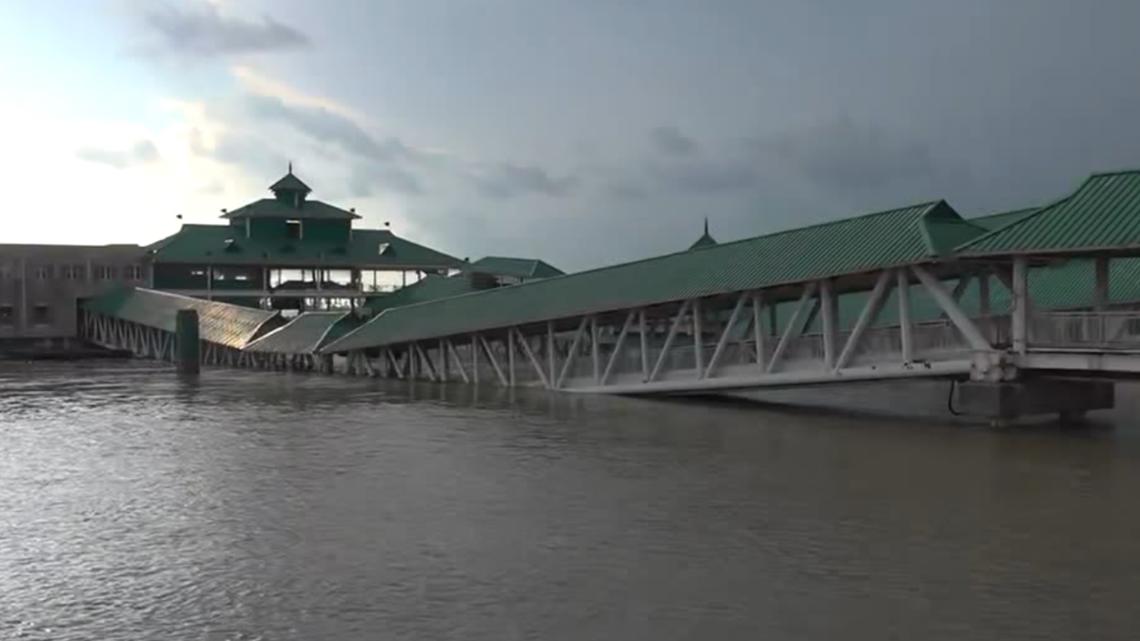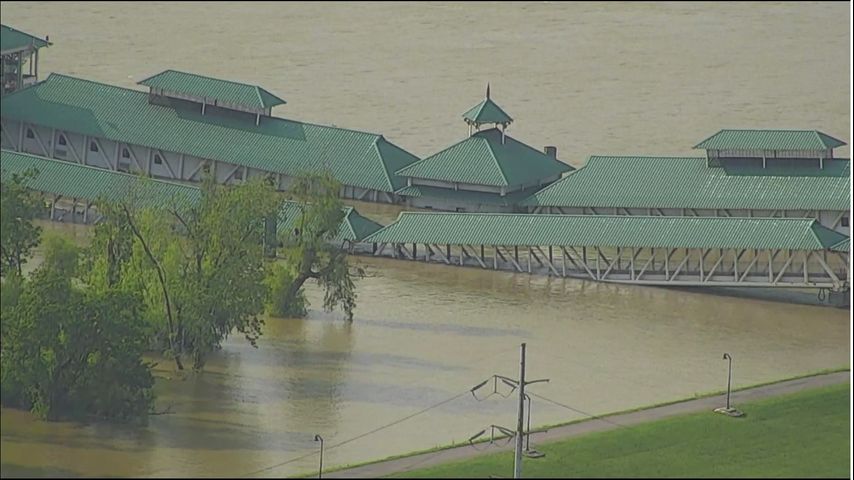The president-elect’s best friend is preparing to cash out of the legendary Las Vegas resort. He tells Forbes about his latest big gamble in Sin City.
By Will Yakowicz, Forbes Staff
Phil Ruffin plans to die at his desk in Las Vegas. On a Wednesday in December, the 89-year-old casino billionaire is sitting right where he plans to cash in his chips—in his office at Treasure Island, the Strip casino-hotel he bought from MGM for $775 million in 2009 (or about $1.1 billion today)—and brushes off the idea of retiring.
“What am I going to do, watch TV?” says Ruffin, wearing a crisp white shirt under a blue blazer. “We live a long time—my mother lived to 103, but I took the car away from her when she was 95.”
Most days, Ruffin is at his desk, which is covered with papers, an oversized calculator and a magnifying glass, by 5 a.m. because he also owns Casino Miami in Florida, three time zones away. “If there is a problem, I can handle it,” he says.
Right now, however, he’s focused on his other property in Vegas, the legendary Circus Circus, which sits on 102 acres on the north end of the Strip, close to the Sphere and the new Fountainbleau. Ruffin says he has been approached by buyers to sell Circus Circus.
“Let’s just say there is interest,” he says coyly. “It’s worth $5 billion.”
Big Top: Circus Circus opened in 1968 as Las Vegas’ first family-friendly hotel. Ruffin bought the property in 2019 for $825 million.
AaronP/Bauer-Griffin/GC Images
Ruffin, who Forbes estimates is worth a conservative $4.7 billion—although he says he is closer to $8 billion—bought Circus Circus for $825 million from MGM in 2019 (roughly $1 billion today). Originally built in 1968 by Jay Sarno, a Vegas hall-of-famer who opened Caesars Palace two years earlier, the property featured live circus acts, trained elephants and monkeys on the gaming floor, and was billed as Sin City’s first family-friendly casino. The property struggled until Bill Bennett and William Pennington took it over in the 1970s, establishing it as one of the city’s most iconic properties.
The monkeys and elephants are long-gone, and the casino has seen better days. “Have you been in there? It’s gruesome,” says an executive of a high-end casino further down the Strip. “The North Strip is a rough neighborhood.” (Case in point: In 2018, a man broke into a room at Circus Circus and stabbed and killed two people.) But its budget reputation, indoor theme park, live circus performers, and cheap room rates still attract its bread-and-butter demographic: middle-class gamblers with kids.
“We do well,” says Ruffin. “We sell $2 beer, $2 hot dogs, $2 popcorn. People love it. A guy can eat and drink for six bucks.”
But Ruffin did not buy Circus Circus only to cater to the low rollers of Las Vegas. He bought it for its potential upside, he says, glancing at his $100,000 Patek Philippe watch.
“Why do you think I bought Circus Circus? For the 102 acres,” he says. “That’s the land play. Remember what I did at the Frontier, how the value of the land went crazy—here it’s going crazier.”
In 1998, Ruffin bought the Frontier for $165 million (around $320 million today), which was plagued by a labor strike until Ruffin settled it. Nine years later, he sold the Frontier for $1.2 billion—seven times what he paid for it. While Nevada as a whole is on a winning streak, breaking gaming revenue records in each of the last four years, businesses on the northern end of the Strip are struggling.
The Sphere, sports mogul James Dolan’s new $2.3 billion venue near the north end of Las Vegas Boulevard, is attracting thousands of fans to sold-out shows but lost $480 million last year. Resorts World Las Vegas, which opened in 2021, recently reported its worst quarter in two years with revenues down 23%. The Fountainbleau, partly owned by Koch Real Estate Investments, is reportedly struggling to find its financial footing. But there are positive developments in Sin City: the Oakland A’s are moving to a new stadium on the site of the recently demolished Tropicana casino. And Ruffin has some valuable land for sale.
“It’s the best piece of land on the West Coast,” he boasts. “It’s got the highway, it’s got the Sahara, it’s got 2,000 feet on the Strip, and it’s the last Strip property. And 102 acres is just a massive amount of land—you can almost build a city on it.”
Though Ruffin is prone to exaggeration, he has a proven track record and is well-respected in Las Vegas. Soo Kim, the chairman of Bally’s Corporation and the managing partner of hedge fund Standard General, considers Ruffin a legendary businessman.
“He is a smart guy, and his purchase of Treasure Island was genius,” says Kim, who is in the process of taking Bally’s private in a $4.6 billion deal. “He is part of the fabric of Las Vegas gaming.”
Chad Beynon, a gaming analyst at Macquarie, says that venues like the Las Vegas Convention Center and the Sphere and new properties like the Fountainbleau have become major attractions in Ruffin’s part of town. “The overall center of gravity continues to shift to the north end of the Strip,” says Beynon.
And Ruffin is not only one of the last independent casino moguls, he is also best buddies and business partners with the incoming President of the United States, Donald Trump. The two co-own the Trump International Hotel in Vegas, a gleaming golden hotel where earlier this month, a 37-year-old U.S. Army Green Beret, committed suicide and blew up a rented Tesla Cybertruck, injuring seven people.
Trump and Ruffin have been friends for decades. Trump was Ruffin’s best man, and they’ve spent the last 12 New Year’s Eves together at Mar-a-Lago. This year, Ruffin said he sat at the same table as billionaire and mega GOP donor Miriam Adelson, who cofounded the Las Vegas Sands casino empire with her husband, Sheldon, who died in 2021. Also in attendance: the world’s richest man, Elon Musk, who donated more than $200 million to the Trump campaign and has become a key adviser to the president-elect.
“I told [Musk] that he’s a credit to the United States,” says Ruffin. “The richest man in the world, for God’s sake. That kid is very smart.”
Golden Moment: Donald Trump and Phil Ruffin in 2005 at the groundbreaking ceremony for Trump International Hotel and Tower in Las Vegas.
Ethan Miller/Getty Images
Ruffin says that he talks to Trump regularly, pointing to a framed photo of the two billionaires in the Oval Office. “I speak to him all the time,” says Ruffin, who will attend the inauguration. “I give him suggestions; he doesn’t take [them].”
Ruffin’s most recent suggestion was to make Marco Rubio Trump’s Vice President. But Trump picked Ohio Senator JD Vance. (Trump nominated Rubio to be Secretary of State instead.) Ruffin and Trump have also discussed tariffs, which Ruffin believes are necessary to protect American manufacturing and jobs. (Ruffin owns Harper Trucks, a small hand truck manufacturer in Kansas.)
“I wouldn’t presume to tell him what to do on tariffs,” he says. “Tariffs are not new. It’s like buying shelf space in a big supermarket, and the U.S. is the big supermarket. Tariffs would be appropriate in some fashion, but that’s for Mr. Trump to figure out.”
The two billionaires have also talked about the Panama Canal, which President Trump has said needs to be controlled by the United States. “We did agree that something needs to be done with the Panama Canal,” he says. “I can’t imagine us giving away that canal for $1, as President Carter did. It is critical.” Ruffin also agrees with Trump’s tough stance on immigration: “He’s going to concentrate on the criminals, and everybody’s in favor of that,” he says. As for Russia’s invasion of Ukraine, Ruffin, whose wife is Ukrainian, says Trump will end that war. “If anybody can settle it, Donald can,” he says.
Politics aside, Ruffin is in the process of building a new casino in his hometown of Wichita, Kansas, at what was a greyhound racing track he owns. He is investing $200 million on the site, building what will become The Golden Circle, which will feature slot-machine-like parimutuel games, a honky-tonk called Gilley’s Saloon and an outdoor concert venue. It is expected to open this fall.
When Ruffin sells Circus Circus, he plans to buy another property on the Strip with the proceeds. If he invests the money into another business, he will be able to avoid paying capital gains. His preference is to buy something in Vegas, where Brendan Bussmann, a gaming analyst, says “everything is always on the table” at the right price. But if Vegas does not work out for Ruffin’s next move, he is willing to look for opportunities in other states. “I have my eyes on some properties,” says Ruffin, elusively. “It could be in another town, if it’s good enough.”
Ruffin is confident his next big bet will work out, but he has a nice cushion to fall back on regardless of what happens. “I have more money than I can handle,” he says. But that doesn’t mean the self-made billionaire forgets where he came from: a working-class state-champion high school wrestler from Wichita. “I started out with zero—nothing,” he says. “I got down, one time, to 28 cents.”





